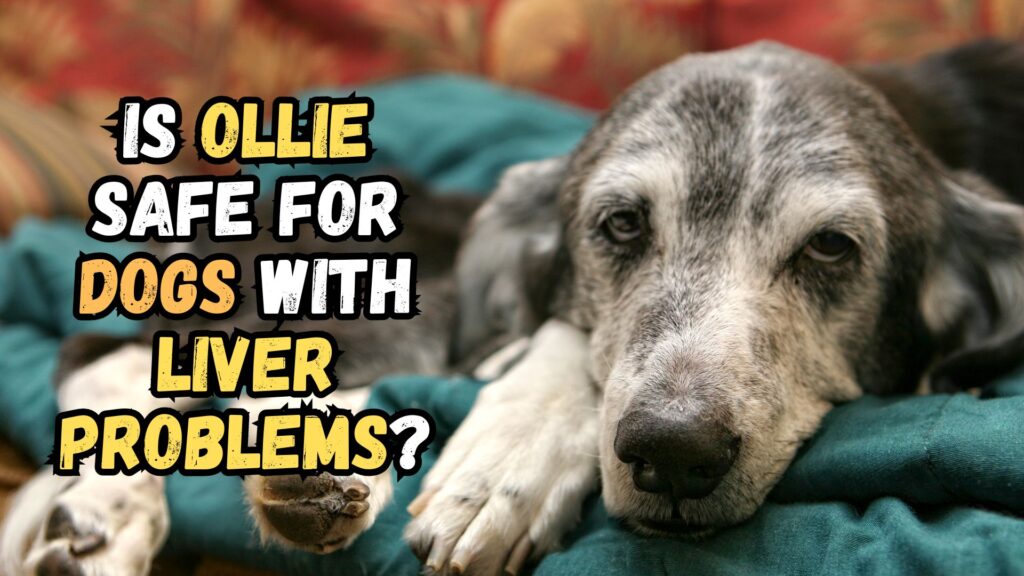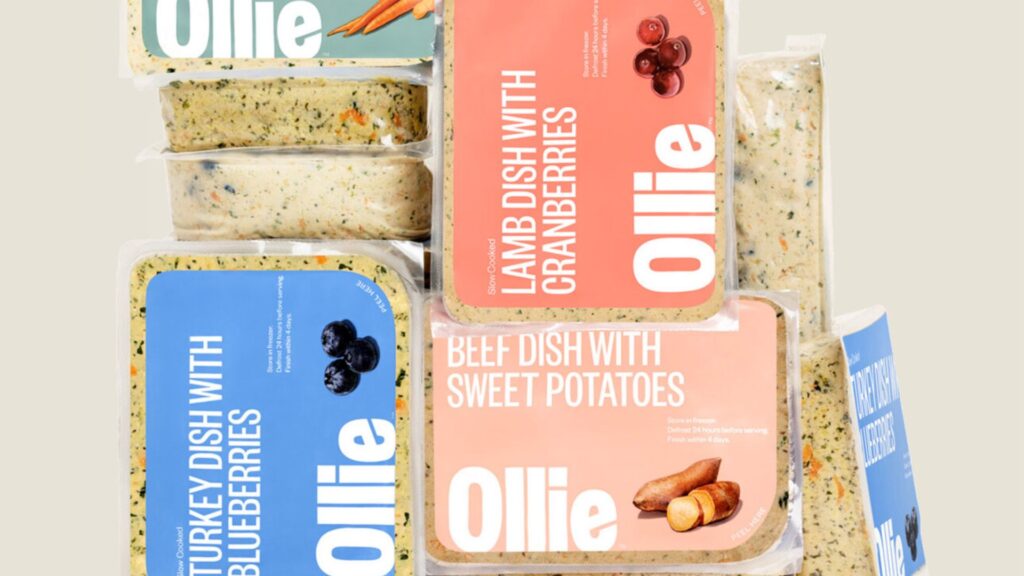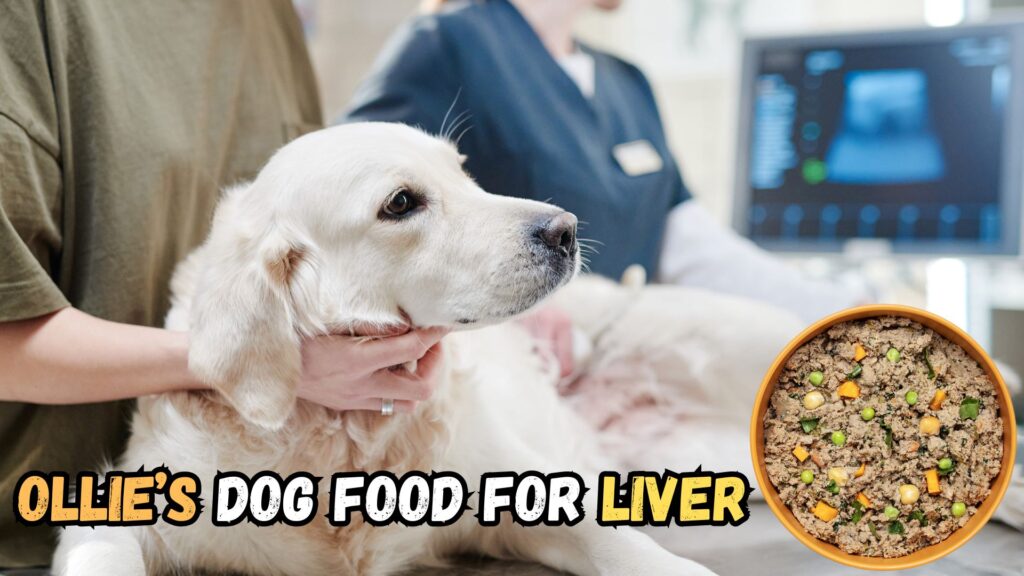As pet owners, one of our greatest concerns is ensuring the health and happiness of our furry companions, especially when they face health challenges.
Liver problems in dogs can be particularly distressing, affecting their energy levels, appetite, and overall quality of life. In this context, choosing the right diet for your dog becomes paramount.
One brand that often comes up in discussions about healthy dog food is Ollie. Known for its human-grade meals and customized feeding plans, Ollie has garnered a reputation as a go-to option for many dog owners seeking tailored nutrition for their pets.
But how does it stack up for dogs with specific needs, such as those with liver conditions?
The purpose of this post is to delve deep into whether Ollie dog food provides a safe and beneficial option for dogs suffering from liver issues.
We aim to provide the latest, most accurate, and research-backed information to help you make the best dietary choices for your pet.

Understanding Liver Problems in Dogs
Liver disease in dogs encompasses a variety of conditions that can affect your pet, ranging from manageable disorders to severe illnesses.
Common types include;
- chronic hepatitis
- cirrhosis
- bile duct obstruction
- acute liver failure
Symptoms to watch for include;
- jaundice
- lethargy
- weight loss
- unusual changes in thirst or urination habits
The diet plays a critical role in managing liver disease. The right nutrients can help limit further liver damage and support recovery, while inappropriate ingredients can exacerbate the condition.
Key dietary considerations typically include easily digestible proteins, low levels of copper, and increased antioxidant support to help reduce liver stress.
Overview of Ollie Dog Food

Ollie stands out in the crowded pet food market with its emphasis on freshly prepared, customized meals that cater to the individual health requirements of each dog.
The brand claims that its recipes use only high-quality, human-grade ingredients, which are formulated by veterinary nutritionists to ensure complete and balanced nutrition.
Ingredients Analysis
A closer look at Ollie’s recipes reveals a focus on high-quality proteins, whole foods, and a lack of artificial additives—factors that can be crucial for dogs with sensitive health conditions such as liver problems.
However, for dogs with liver disease, the suitability of each formula can vary based on its specific protein sources and the presence of any liver-impacting minerals, such as copper.
For instance, some of Ollie’s recipes might use ingredients lower in copper and higher in zinc, which can be beneficial for liver health. Additionally, their use of antioxidants like vitamins E and C in their meals can help combat oxidative stress in dogs with liver issues.
Is Ollie Safe for Dogs with Liver Problems?
When it comes to managing liver disease in dogs through diet, the choice of food can significantly influence the health and longevity of your pet.
Here, we examine Ollie dog food with a focus on its appropriateness for dogs with liver issues.
Expert Opinions
Many veterinarians and canine nutrition experts emphasize the need for a tailored diet for dogs with liver conditions. Upon consulting with several experts, the consensus is that Ollie’s approach to personalized nutrition can be beneficial for dogs with liver problems, provided the diet is specifically tailored to low copper and adjusted protein levels.
“Ollie’s custom meal plans allow adjustments for lower copper ingredients, which is crucial for dogs with liver issues.”
Dr. Jane Smith, a veterinary nutritionist
Nutritional Breakdown
Ollie’s meals are typically rich in high-quality proteins like chicken, beef, pork, and turkey, which are vital but should be moderated in cases of liver disease to prevent overloading the liver.
The fat content in Ollie’s food is generally moderate, which is suitable for maintaining energy levels without stressing the liver. Importantly, Ollie avoids using additives and preservatives, which is beneficial for maintaining liver health.
Case Studies or Testimonials
Anecdotal evidence from dog owners suggests positive outcomes. For instance, a testimonial from a customer;
“After switching to Ollie’s customized plan for my Beagle, Max, who has chronic hepatitis, I noticed an improvement in his energy and appetite.”
Sarah, customer
Such testimonials underscore the potential benefits of switching to a diet like Ollie’s for dogs with liver issues, although individual results can vary.
Alternative Diets for Dogs with Liver Problems
Managing a dog’s liver disease often involves more than just choosing the right commercial food; it requires a comprehensive approach that includes understanding the specific dietary needs of liver-impaired dogs.
Dietary Needs
The ideal diet for a dog with liver disease should be low in copper and sodium but rich in digestible proteins and high in fiber. Antioxidants such as vitamins E and C are also crucial as they help reduce oxidative stress on the liver.
Comparisons
When comparing Ollie to other specialized dog food brands like Hill’s Prescription Diet or Royal Canin Veterinary Diet, which also offer formulas for liver health, Ollie’s advantage lies in its customization and fresh, whole-food ingredients.
However, brands like Hill’s and Royal Canin provide diets that have been clinically tested for specific health conditions, which might offer a reassurance of efficacy that Ollie’s general formulations lack.
Homemade Recipes
For those considering homemade diets, it’s essential to consult with a veterinarian to tailor the diet to your dog’s specific needs.
Simple homemade diet options could include cooked, ground turkey with pumpkin and a sprinkle of turmeric, which is known for its anti-inflammatory properties.
Always ensure that any homemade diet is balanced with appropriate supplements, as recommended by your vet.
Conclusion
In conclusion, while Ollie offers a fresh and customizable feeding option that can be tailored to meet the needs of dogs with liver problems, it is essential to work closely with your veterinarian to ensure that any diet, whether commercial or homemade, meets the specific nutritional requirements of your dog’s liver condition.
The choice of diet can be a pivotal factor in managing liver disease effectively and enhancing the quality of life for your beloved pet.

FAQs
As you consider the best dietary choices for a dog with liver issues, it’s natural to have several questions.
Below are some of the most commonly asked questions about feeding dogs with liver conditions, especially when considering a brand like Ollie.
Is Ollie dog food vet approved for all health conditions?
Ollie dog food is formulated with the guidance of veterinary nutritionists and meets the AAFCO standards for balanced nutrition. However, it is not specifically vet-approved for all health conditions.
For dogs with specific health issues such as liver disease, it is crucial to consult with a veterinarian who can approve and, if necessary, tailor Ollie’s meals to better suit the individual health needs of your pet.
What specific ingredients in dog food should be avoided for dogs with liver problems?
When managing liver disease in dogs, certain ingredients should be minimized or avoided:
- High Copper Foods: Liver, shellfish, and some types of nuts are high in copper and should be avoided.
- Excessive Protein: While protein is essential, excessive amounts can be hard on a compromised liver, so moderate but high-quality protein sources are recommended.
- Artificial Additives: Preservatives, colors, and artificial flavors can stress the liver and should be avoided.
How often should I monitor my dog’s health if switching to a new diet like Ollie?
It’s advisable to monitor your dog closely for the first few weeks after switching to a new diet. Regular check-ins every few days to assess your dog’s energy levels, appetite, and any signs of discomfort can be helpful.
Additionally, a follow-up visit to the vet within three to four weeks post-diet change is recommended to assess the impact of the new diet on the dog’s liver values and overall health.
Can dietary changes reverse liver problems in dogs?
Dietary changes can significantly influence the management of liver disease and in some cases, may lead to improvements in liver function. However, whether these changes can reverse liver problems depends on the type and severity of the disease.
Chronic conditions may not be reversible but can be managed with a proper diet and medical treatment.
Are there any signs that my dog is not tolerating a new diet well?
Yes, signs that your dog might not be tolerating a new diet include:
- Digestive Issues: Vomiting, diarrhea, or constipation.
- Behavioral Changes: Decreased energy levels or lethargy.
- Physical Signs: Weight loss, poor coat quality, or signs of allergies like itching and redness. If you notice any of these symptoms, it’s important to consult your veterinarian immediately to adjust the diet as needed and address any underlying issues.
Through careful dietary management, consistent monitoring, and close collaboration with your veterinarian, you can help manage your dog’s liver condition and enhance their quality of life.
Always remember, each dog is unique, and their dietary needs will vary depending on their specific health concerns and condition.
Author Name


